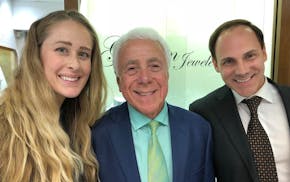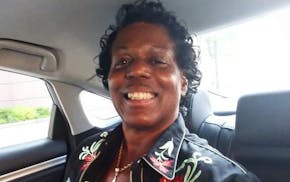"When I come home it's nice to have a little justice," Ron Meshbesher enjoys saying. His dog's name is Justice.
Meshbesher's 57-year legal career came to a close in January when he retired from Meshbesher & Spence. His name will remain on the law firm for which Meshbesher coined the slogan: "The lawyer you choose makes a difference."
Now he spends his days with Justice, Kim, his wife of 25 years, and when possible his favorite new person, first granddaughter Archer, 3. She'll soon be joined by a little brother whose name will be Anton Ronald. Meshbesher, a father of four daughters, is thrilled about the pending arrival of the baby boy and namesake. Meshbesher is so taken with Archer, he's thinking that less time will be spent across the pond at the property he and Kim have in southern France.
I talked to the internationally known and respected lawyer in advance of a small celebration of his career. Although he had tremendous success in civil law, he said, "Defending people was the best."
Q: Did you ever have another law firm try to appropriate your "The lawyer you choose makes a difference" tagline?
A: We got a trademark of some sort because we had somebody who tried to take it away from us. Once they got a letter from my office, they stopped and apologized.
Q: Will you be seen in any more commercials for Meshbesher & Spence?
A: I don't think so. There's a group there, most of them are a lot younger and there are a few who are going to retire in a few years. They are some good lawyers. I trained a lot of them. They are doing well.
Q: Was the decision to retire difficult for one of the best lawyers in America?
A: Not really. I've practiced law longer than almost every lawyer in Minneapolis. I'm an old man.
Q: You got Marjorie Caldwell acquitted in one of the most famous murder cases in Minnesota history, the death of her mother, Elisabeth Congdon. Since the time you spent examining the murder scene for trial, have you taken the tour of Glensheen?
A: Twice. After the case, we went to a meeting [near Duluth] and stood in line. The locals in that area had a party one night and invited me. Then it was very difficult to go upstairs but now, apparently, you can go almost every place.
Q: If every defendant deserves a good lawyer, could you have been a defense attorney at the Nuremberg trials?
A: It probably would be very difficult because they were there for killing all the Jews. It would be hard for me to represent those people [as a Jew].
Q: How would you have defended Amy Senser?
A: I followed the case a little bit, not fully. I think it was a tough case because the woman left the scene. People just didn't believe what she was saying about it. They weren't able to find out if she was drinking too much. That's a tough case for anybody to win.
Q: Former Viking Darren Sharper has been charged with drugging and raping women in California and Arizona. He is being investigated on similar charges in other states. If people who don't know each other are telling the same story about your allegedly criminal behavior, is it possible all those accusers are lying?
A: The jury will decide. It doesn't look good on the surface. Put it that way.
Q: Remember your client Ming Sen Shiue jumping over the defense table, charging the witness stand and attacking the star witness, Mary Stauffer?
A: I've never forgotten it.
Q: Was that the scariest thing that ever happened in court? [1981]
A: It certainly was, in a trial, no question about it. I was questioning the main witness against Shiue, who I claimed was mentally ill. Didn't claim he didn't do it. It was an awful case. Jumped up and pulled a knife that he got from somebody in jail and held it against her. I was just stunned. Jurors started crying. It was absolutely frightening. I said to myself, "Please, cops, don't screw it up." Within one minute they jumped him. [Stauffer required numerous stitches.] Thank God, he didn't kill her. They took him off and he was stiff as a board. The guy was sicko. I tried to get this jury disqualified. But the judge said he did it himself. He probably did the right thing. I said, "Judge, that's why I'm saying this guy's got a problem." He was found guilty. Fortunately, I never had another case like that. What happened was just horrendous. I know the people who worked with [the witness who was cut] sort of blamed me for it, which bothered me because I was doing what I was supposed to do in that case. They made remarks. I read some of the things in the newspaper and I didn't like it but I said, Well.
Q: How did that incident change you?
A: I don't think it changed me. I thought about it a lot but it didn't deter me from taking on a case and representing a client. As a criminal defense lawyer that is obviously your job. If you can't do it, get out of the courtroom.
Q: If there is one thing you could change about the legal system, what would it be?
A: I think the system in Minnesota is better than most and I was upset when [they took] away the right of the defendant to [have] the final word [in closing arguments]. I don't think it changed anything [considering the number] of cases won by the defendant. It was a good system and it should have stayed because it didn't make any difference in terms of the outcome. But the prosecutors were babies. They cried about everything, every time they lost a case.
Q: You were a prosecutor?
A: I tried cases for three years, right out of law school. I lost my first case as a prosecutor. I said this is not for me. I was really upset by it. After that I think I only lost three cases in the three years I was there and two of them I should have won. I probably had the best record of anybody in the county attorney's office during that period of time, which gave me the confidence to go out in private practice. It was funny, when I went up there to say goodbye to the guys in the jail, I said, "You know, these guys all look innocent now. [Before] they looked guilty as hell." Soon as I started getting business from them, they all looked innocent. Getting into other areas of law was very helpful. I did almost everything in law.
Q: Do you know enough to commit the perfect crime? In other words, not get caught?
A: I don't think anybody knows it. Some get away with it. Some are very cocky. I would never attempt to even for the rottenest son of a b.
Q: Can it be that you don't have any hobbies?
A: I don't know if that's true. I was flying planes for a while. I was very proud of that. I go to the movies and I love to go to theater. I've been going to the Guthrie since it started.
Q: Legal TV shows generally don't appeal to you?
A: "Perry Mason," as a kid, I always followed. He was my favorite. But the son of a gun never lost a case, so he didn't teach me much.
Q: With the permission of your wife, Kim, I'm asking "Who You'd Rather" from CBS' "Good Wife:" Julianna Margulies or Christine Baranski?
A: My wife. They're not even close. She's [Margulies] cute but I'm a married man. She's cute, too [he said of Baranski]. But you know I'm too old for these ladies. Face it here.
Q: Have you always thought you were too old or is this a new attitude?
A: I haven't always felt that way. I'm getting older. You get embarrassed if you try to make love with somebody my age. They would walk away from you, even if I wasn't married.
Q: Do you own more than one of those crazy tartan plaid suits you wore annually to your Christmas parties?
A: I love it, except it's hard for me to wear the pants. I'm a little bigger in the waist but still have it and I wore it this year. I'll show it to you.
Q: How's your French?
A: My French is lousy. My wife's is beautiful. She spent a lot of time and lot of money becoming a very good speaker in that field. I know a few things. We go to lunch a lot of times in France and I say, "L'addition, s'il vous plaît." The check please. [Laughs]
Interviews are edited. To contact C.J. try cj@startribune.com and to see her watch Fox 9's "Buzz."

C.J.: Jerry O'Connell gets support from Wendy Williams for talk show



